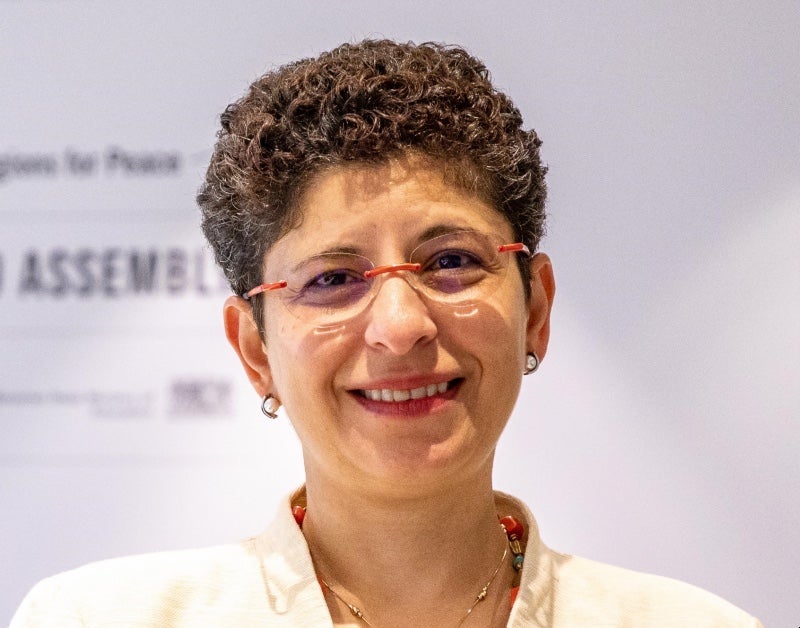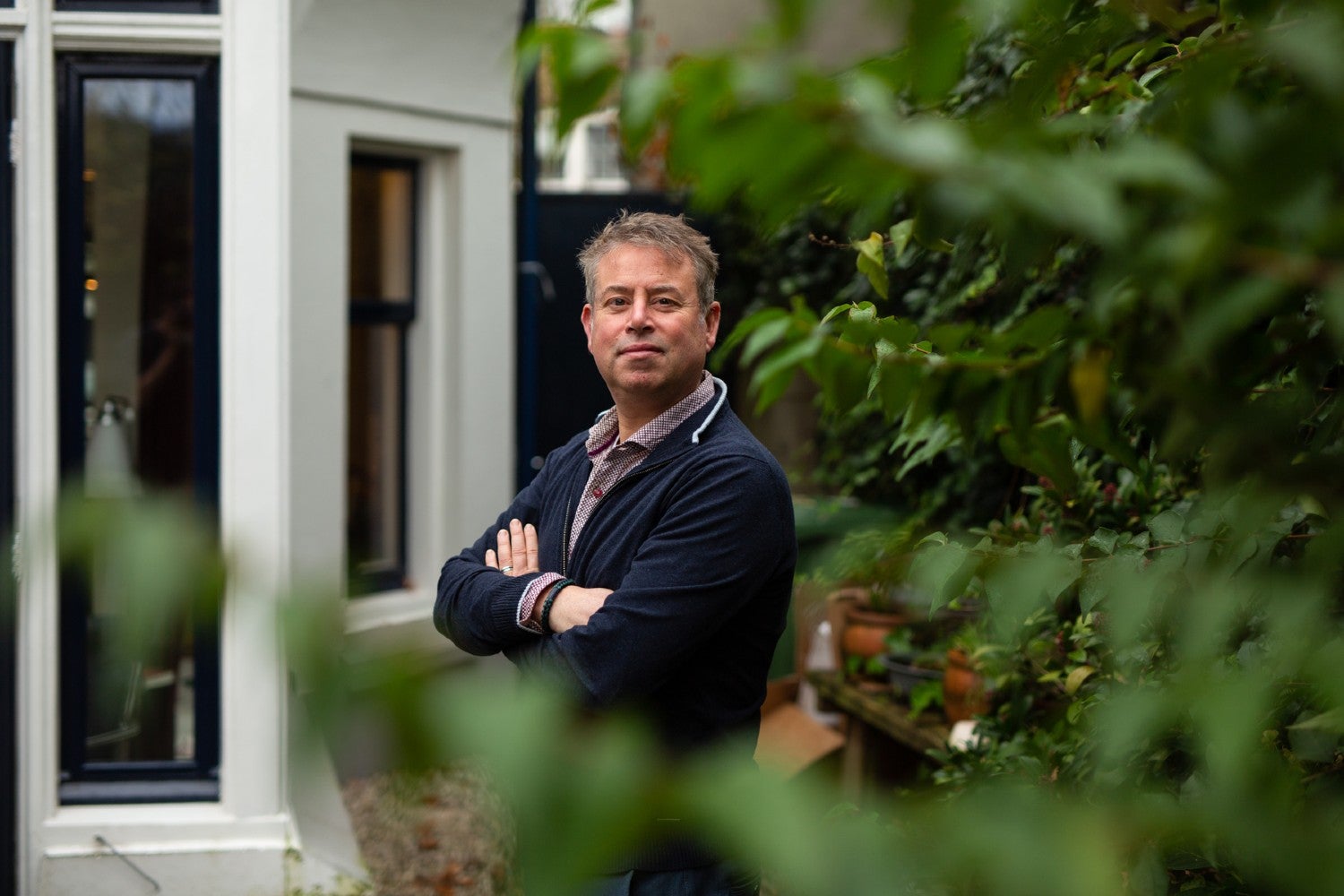„The more institutionalised the religion, the more dominant the framework of gender, sex and patriarchy is”, says Azza Karam, professor at VU Amsterdam.
Speaking from New York in a video interview, the Professor, who is Egyptian by birth, talks about her commitment to gender equality, the role of sexuality within religions, and her experiences as the first female Secretary General of Religions for Peace.
As the daughter of a diplomat, to what extent has your father’s position influenced your career?
„There is a very simple answer to that: hugely. Being brought up in an environment where diplomacy was the prerequisite, not only for my father, but for his family, I learned a lot. Diplomats interact with ‘others’ and that had a very profound impact on me. I was constantly exposed to national, cultural and religious diversity, and to people with very different ideas and different ways of understanding work and life. I grew up feeling uncomfortable with ‘sameness’ and comfortable with ‘diversity’.”
„An important lesson I learned from my father is humility. He never had time for aggrandisement, which is actually and unfortunately part of the diplomatic business. He had no patience for that at all. Both my parents are deeply religious and therefore maintained there is no God-given right to superiority. On the contrary, if anything, we have a great deal to be thankful for, but also to be humble about.”
After receiving your bachelor’s degree in Cairo, you went to the Netherlands to continue your studies and academic career. You are now working for a Dutch University again. What attracts you to the Netherlands?
„The Netherlands was the perfect environment for me to learn and eventually to strike out on my own. I didn’t really have a choice about coming to the Netherlands, because my father was posted to the Egyptian Embassy in The Hague. And as a good Muslim daughter, who really didn’t have much say in what happened to her, I was transplanted from Egypt. To be honest, I didn’t want to go at the time, but my family insisted.”
„I said to my parents: ‘I’m sorry, but this is the life I choose for myself.’”
„Looking back, however, I am so grateful that things happened the way they did, because the move came at the same time that I was questioning a lot of things in my life. I was not happy with the course that had been mapped out for me, although I knew my parents and my culture meant well. I wanted to be able to choose how to live my life and I wanted the freedom to make the mistakes I was sure I was going to make. And did make! And I wanted to be able to apply for a scholarship and for jobs. Therefore I said to my parents: ‘I’m sorry, but this is the life I choose for myself.’”
Can you tell us something about your time in The Netherlands?
„I remember going to the beach at Scheveningen once with my family. It was Ramadan, so we were all fasting during the daytime. It was the height of summer, and as we approached the beach, we could see that some women were also topless. I remember my mother and father wondering ‘Should we continue to the beach or should we just go back?’ But it was such a warm day and we were fasting and wanting to do something to pass the time on the weekend, so we ended up going and still finding a little space for ourselves on the sand. I remember almost every step of that journey and the thoughts that were going through our minds. The ultimate question was: ‘Will we be accepted?’, because we felt we were overdressed for this space.”
„The sense of otherness was incredibly intense."
„At one point the lifeguard came towards us and we were so convinced he was going to tell us we were just not supposed to be here. But he came to us and gave us a piece of paper and asked: ‘Could you please translate this into whatever language you speak?’ It was an advisory saying ‘please don’t go swimming’, because the wave level was quite high. We were so relieved that we were not being told to leave or receiving comments on our appearance or anything. But still the sense of otherness was incredibly intense. Those are the kinds of little situations in life that teach us a lot about how we feel and how we are perceived, and what is the best way of trying to navigate all these differences that are happening at a given moment in our existence.”
One of your key priorities at the organisation Religions for Peace has to do with gender equality. In another interview you said that this topic has never quite been spelled out in interreligious work before. Can you explain why?
„Gender is very often intimately connected to sexuality – who we believe we are, how we feel and see and use our bodies. For this reason, almost all faith traditions have an opinion on the matter. The more institutionalised the religion, the more dominant the framework of gender, sex and patriarchy. Sex is for procreation, nothing else. God forbid you should even think of enjoyment. Religious institutions in particular are not prepared to negotiate on sex and sexuality, because once you start looking at how these norms are built up from sexual relations and sexual identity all the way up to leadership, you begin to question that foundation, that authority, and even the primacy of that institution. This means that no religious institution is willing to discuss sex and sexuality in any open way.”
„But if you bring up sex, sexuality, sexual identity, sexual relations. Ooh la la, no way.”
„I saw this so clearly when I worked for the UN (United Nations). Religious leaders were all prepared to speak about the environment and children’s rights and promoting equality generally for all people and refugees. But if you bring up sex, sexuality, sexual identity, sexual relations. Ooh la la, no way.”
How do you look back on your first year at Religions for Peace?
„One of the most beautiful things I am learning is that I am honestly constantly amazed by the willingness of our religious leaders, who represent these different institutions. There are over 100 religious leaders who all come from different faith traditions, including indigenous ones. I am really deeply touched and hugely moved by how willing these people are to devote time to being part of this movement, this effort, this dream of religions for peace. To actually stand shoulder to shoulder. And at the same time, I feel enormous pressure from the thought of, ‘Oh my god, how can we honour that? How on earth can a staff of fifteen people honour 100 religious leaders and their institutions and their networks who are willing to, and do in fact, commit their time, their effort, their money, their everything, to serving?’”
During your inaugural lecture in June 2019 at VU Amsterdam, you quoted Northrop Frye: “To truly listen is to risk being changed forever”. Can you explain what this quote means to you?
„This is about both the danger to and the opportunity for the very essence of who we think we are, if we were to genuinely listen to one another. It may dramatically challenge us, because we think we know ourselves so well. We think we hear and we listen, but we actually do not. We are constantly walking this very thin line in life and in danger of falling off. If you do fall off, you would completely lose your certainty, but at the same time, imagine what you might find if you fall off. Imagine the grace that can happen when you genuinely challenge what you hold to be dear and true. And it’s particularly in times of crisis that we listen even less well, because we are worried. So this is the time to remember that quote.”








